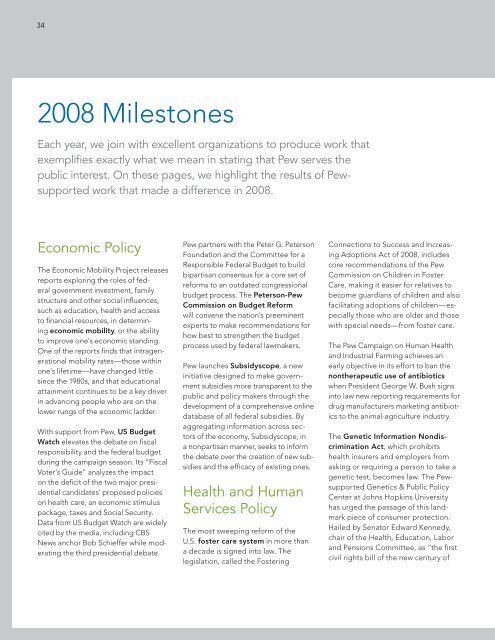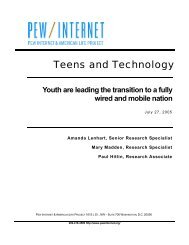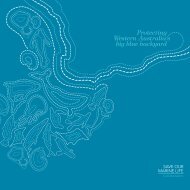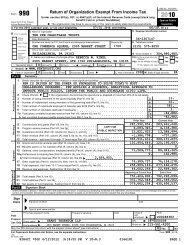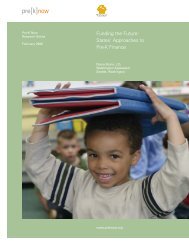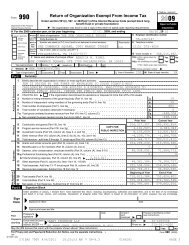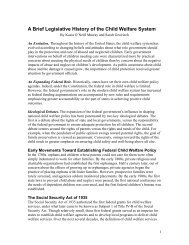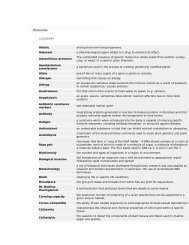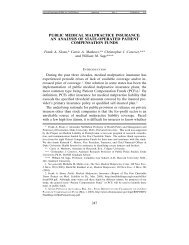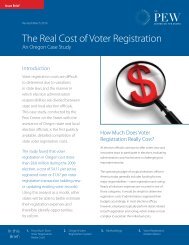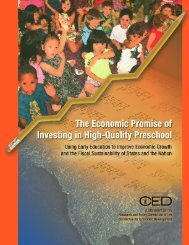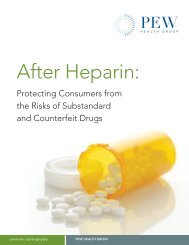PROSPECTUS - The Pew Charitable Trusts
PROSPECTUS - The Pew Charitable Trusts
PROSPECTUS - The Pew Charitable Trusts
Create successful ePaper yourself
Turn your PDF publications into a flip-book with our unique Google optimized e-Paper software.
34<br />
2008 Milestones<br />
Each year, we join with excellent organizations to produce work that<br />
exemplifies exactly what we mean in stating that <strong>Pew</strong> serves the<br />
public interest. On these pages, we highlight the results of <strong>Pew</strong>supported<br />
work that made a difference in 2008.<br />
Economic Policy<br />
<strong>The</strong> Economic Mobility Project releases<br />
reports exploring the roles of federal<br />
government investment, family<br />
structure and other social influences,<br />
such as education, health and access<br />
to financial resources, in determining<br />
economic mobility, or the ability<br />
to improve one’s economic standing.<br />
One of the reports finds that intragenerational<br />
mobility rates—those within<br />
one’s lifetime—have changed little<br />
since the 1980s, and that educational<br />
attainment continues to be a key driver<br />
in advancing people who are on the<br />
lower rungs of the economic ladder.<br />
With support from <strong>Pew</strong>, US Budget<br />
Watch elevates the debate on fiscal<br />
responsibility and the federal budget<br />
during the campaign season. Its “Fiscal<br />
Voter’s Guide” analyzes the impact<br />
on the deficit of the two major presidential<br />
candidates’ proposed policies<br />
on health care, an economic stimulus<br />
package, taxes and Social Security.<br />
Data from US Budget Watch are widely<br />
cited by the media, including CBS<br />
News anchor Bob Schieffer while moderating<br />
the third presidential debate.<br />
<strong>Pew</strong> partners with the Peter G. Peterson<br />
Foundation and the Committee for a<br />
Responsible Federal Budget to build<br />
bipartisan consensus for a core set of<br />
reforms to an outdated congressional<br />
budget process. <strong>The</strong> Peterson-<strong>Pew</strong><br />
Commission on Budget Reform<br />
will convene the nation’s preeminent<br />
experts to make recommendations for<br />
how best to strengthen the budget<br />
process used by federal lawmakers.<br />
<strong>Pew</strong> launches Subsidyscope, a new<br />
initiative designed to make government<br />
subsidies more transparent to the<br />
public and policy makers through the<br />
development of a comprehensive online<br />
database of all federal subsidies. By<br />
aggregating information across sectors<br />
of the economy, Subsidyscope, in<br />
a nonpartisan manner, seeks to inform<br />
the debate over the creation of new subsidies<br />
and the efficacy of existing ones.<br />
Health and Human<br />
Services Policy<br />
<strong>The</strong> most sweeping reform of the<br />
U.S. foster care system in more than<br />
a decade is signed into law. <strong>The</strong><br />
legislation, called the Fostering<br />
Connections to Success and Increasing<br />
Adoptions Act of 2008, includes<br />
core recommendations of the <strong>Pew</strong><br />
Commission on Children in Foster<br />
Care, making it easier for relatives to<br />
become guardians of children and also<br />
facilitating adoptions of children—especially<br />
those who are older and those<br />
with special needs—from foster care.<br />
<strong>The</strong> <strong>Pew</strong> Campaign on Human Health<br />
and Industrial Farming achieves an<br />
early objective in its effort to ban the<br />
nontherapeutic use of antibiotics<br />
when President George W. Bush signs<br />
into law new reporting requirements for<br />
drug manufacturers marketing antibiotics<br />
to the animal-agriculture industry.<br />
<strong>The</strong> Genetic Information Nondiscrimination<br />
Act, which prohibits<br />
health insurers and employers from<br />
asking or requiring a person to take a<br />
genetic test, becomes law. <strong>The</strong> <strong>Pew</strong>supported<br />
Genetics & Public Policy<br />
Center at Johns Hopkins University<br />
has urged the passage of this landmark<br />
piece of consumer protection.<br />
Hailed by Senator Edward Kennedy,<br />
chair of the Health, Education, Labor<br />
and Pensions Committee, as “the first<br />
civil rights bill of the new century of


